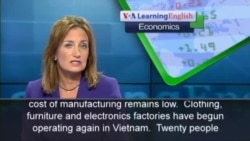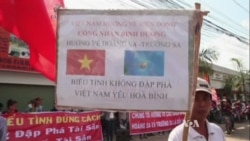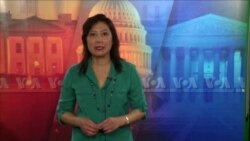ການປະທ້ວງຕໍ່ຕ້ານຈີນ ເມື່ອຕົ້ນປີນີ້ ໄດ້ສ້າງຄວາມເສຍຫາຍໃຫ້
ແກ່ໂຮງຈັກໂຮງງານຂອງຊາວຕ່າງປະເທດຫລາຍກ່ວາ 400 ແຫ່ງ
ແລະນັກລົງທຶນຕ່າງປະເທດຫລາຍພັນຄົນ ໄດ້ພາກັນໜີອອກຈາກ
ປະເທດໄປ ເພາະຢ້ານກົວວ່າຈະມີການກໍ່ຄວາມຮຸນແຮງເພີ້ມຕື່ມ
ແຕ່ວ່າດຽວນີ້ ການລົງທຶນຂອງຕ່າງປະເທດໄດ້ກັບຄືນມາສູ່ລະດັບ
ກ່ອນການປະທ້ວງແລ້ວ. ຜູ້ສື່ຂ່າວວີໂອເອ ພະແນກຮຽນພາສາອັງ
ກິດ Marville Ritter ມີລາຍງານກ່ຽວກັບເລື້ອງນີ້ ຊຶ່ງດາຣາຈະນຳ
ມາສະເໜີທ່ານ.
ເມື່ອເດືອນພຶດສະພາທີ່ຜ່ານມາ ພວກປະທ້ວງຕໍ່ຕ້ານຈີນ ໃນ
ຫວຽດນາມ ໄດ້ສ້າງຄວາມເສຍຫາຍໃຫ້ແກ່ໂຮງຈັກໂຮງງານຂອງຊາວຕ່າງປະເທດ ຢ່າງ
ນ້ອຍ 460 ແຫ່ງ. ນັກລົງທຶນຕ່າງປະເທດຫລາຍພັນຄົນພາກັນຫລັ່ງໄຫລໜີອອກຈາກ
ຫວຽດນາມ. ເຂົາເຈົ້າຢ້ານວ່າ ຈະມີການກໍ່ຈະລາຈົນຕື່ມອີກ. ແຕ່ມາບັດນີ້ ການລົງທຶນຂອງ
ຕ່າງປະເທດ ໄດ້ກັບຄືນມາສູ່ລະດັບກ່ອນການປະທ້ວງແລ້ວ. ການຫລັ່ງໄຫລກັບຄືນມາ
ຂອງເງິນທຶນ ແມ່ນເປັນຍ້ອນສາມເຫດຜົນສຳຄັນ ດ້ວຍກັນ.
ຄືລັດຖະບານໃຫ້ຄຳໝັ້ນສັນຍາທີ່ຈະປົກປ້ອງນັກລົງທຶນຕ່າງປະເທດ. ນອກນັ້ນ ເສດຖະ
ກິດກໍສືບຕໍ່ດີຂຶ້ນ ແລະທ້າຍສຸດ ຄ່າຜະລິດສິນຄ້າກໍຍັງຕໍ່າຢູ່. ພວກໂຮງງານເສື້ອຜ້າ ເຄື່ອງ
ເຮືອນແລະ ເຄື່ອງອີເລັກໂທຣນິກ ໄດ້ເລີ້ມປະຕິບັດການອີກຄັ້ງນຶ່ງແລ້ວ ຢູ່ໃນຫວຽດນາມ.
ມີ 20 ຄົນເສຍຊີວິດໃນການປະທ້ວງ ແລະຫລາຍຮ້ອຍຄົນໄດ້ຮັບບາດເຈັບ. ພວກປະທ້ວງ
ມີຄວາມໂກດແຄ້ນ ທີ່ຈີນໄດ້ເອົາໂຄງສ້າງອຸດສາຫະກຳນ້ຳມັນອັນນຶ່ງ ໄປຕັ້ງໄວ້ຢູ່ໃນບໍລິເວນ
ນ່ານນ້ຳ ທີ່ຫວຽດນາມອ້າງ ວ່າເປັນດິນແດນຂອງຕົນ. ຄວາມເຄັ່ງຕຶງທີ່ມີມາເປັນເວລາຍາວ
ນານ ລະຫວ່າງປະເທດທັງສອງ ໄດ້ຮ້າຍແຮງຂຶ້ນ. ຈີນແລະຫວຽດນາມໄດ້ຕໍ່ສູ້ສົງຄາມຊາຍ
ແດນກັນ ໃນປີ 1979.
ເບິ່ງວີດີໂອກ່ຽວກັບ ການປະທ້ວງຕໍ່ຕ້ານຈີນ ຢູ່ຫວຽດນາມ:
ການລົງທຶນຂອງຕ່າງປະເທດ ປະກອບເປັນ 17 ສ່ວນຮ້ອຍຂອງເສດຖະກິດຫວຽດນາມ
ແລະ 66 ສ່ວນຮ້ອຍຂອງສິນຄ້າສົ່ງອອກຂອງຫວຽດນາມ ທັງສະໜອງເຄິ່ງນຶ່ງຂອງລາຍ
ໄດ້ຈາກພາສີຂອງຫວຽດນາມ.
Ralf Matthaes ເປັນເຈົ້າຂອງບໍລິສັດໂຄສະນາດ້ານການຕະຫລາດ ທີ່ນະຄອນໂຮຈີມິນ.
ລາວກ່າວວ່າ ການລົງທຶນຂອງຕ່າງປະເທດກັບຄືນມາ ກໍຍ້ອນການເອົາບາດກ້າວຢ່າງແຂງ
ຂັນຂອງລັດຖະບານ.
ນັກລົງທຶນຈາກ ຍີ່ປຸ່ນ ສິງກະໂປ ເກົາຫລີໃຕ້ ແລະໄຕ້ຫວັນ ໄດ້ເຂົ້າໄປຍັງຫວຽດນາມ ນັບ
ຕັ້ງແຕ່ລັດຖະບານຫວຽດນາມໄດ້ຍຸດຕິ ການຈຳກັດຮັດແຄບຕໍ່ການລົງທຶນໃນປີ 1987. ໂຄງການຕ່າງໆຂອງພວກເຂົາເຈົ້າໄດ້ຊ່ວຍສະໜັບສະໜຸນເສດຖະກິດ ມູນຄ່າ 155 ພັນ
ລ້ານດອລລ່າ ຂອງຫວຽດນາມ ແລະໄດ້ຫລຸດຜ່ອນຄວາມທຸກຈົນ ໂດຍການສ້າງວຽກງານ
ເພີ້ມຕື່ມ.
ໃນເດືອນກໍລະກົດ ຈີນໄດ້ຍ້າຍຖານເຈາະນ້ຳມັນອອກໄປ ລຸນຫລັງການເຈລະຈາກັບ
ຫວຽດນາມ. ກ່ອນເກີດການປະທ້ວງ ຈີນແມ່ນເປັນນັກລົງທຶນໃຫຍ່ອັນດັບ 7 ຢູ່ໃນຫວຽດ
ນາມ. ປີກາຍນີ້ ຈີນໄດ້ທຳການລົງທຶນໃນມູນຄ່າ 2.300 ລ້ານດອລລ່າຢູ່ໃນຫວຽດນາມ.
ນັ້ນແມ່ນຫລາຍກ່ວາປີ 2012 ເຖິງ 6 ເທົ່າໂຕ. ຈຳນວນຫລາຍຂອງການລົງທຶນດັ່ງກ່າວ
ແມ່ນເປັນພວກວັດຖຸ ທີ່ໃຊ້ໃນການເຮັດເສື້ອຜ້າ ເຄື່ອງຈັກ ແລະສິນຄ້າອື່ນໆ.
ຄາດກັນວ່າ ໃນອະນາຄົດ ຫວຽດນາມຈະເຮັດໃຫ້ງ່າຍຂຶ້ນ ສຳຫລັບພວກນັກລົງທຶນຕ່າງ
ປະເທດ ທີ່ຈະໄປທຳທຸລະກິດຢູ່ໃນປະເທດ ຄືຫວຽດນາມຈະອະນຸຍາດໃຫ້ນັກລົງທຶນຕ່າງ
ປະເທດ ມີສິດຫລາຍຂຶ້ນໃນການຊົມໃຊ້ ທີ່ດິນ. ແລະຫວຽດນາມຈະສ້າງລະບົບຂົນສົ່ງໃໝ່
ທີ່ເຊື່ອມຕໍ່ນະຄອນໂຮຈີມິນ ໃສ່ກັບພວກເຂດຜະລິດສິນຄ້າຕ່າງໆ.
ວີດີໂອພາສາລາວ: ຊາວຫວຽດນາມພາກັນຂວ້ຳບາດສິນຄ້າຈີນ:
ແລະນັ້ນກໍແມ່ນລາຍງານເສດຖະກິດ ຈາກພະແນກຮຽນພາສາອັງກິດຂອງວີໂອເອ.
ຄຳສັບຈາກລາຍງານ ທີ່ເຮົາຈະສອນທ່ານມື້ນີ້ ກໍມີຄຳວ່າ
foreign f-o-r-e-i-g-n foreign ແປວ່າ ຕ່າງປະເທດ
investors i-n-v-e-s-t-o-r-s investors ແປວ່າ ພວກນັກລົງທຶນ
border b-o-r-d-e-r border ແປວ່າ ຊາຍແດນ
poverty p-o-v-e-r-t-y poverty ແປວ່າ ຄວາມທຸກຍາກ
rights r-i-g-h-t-s rights ແປວ່າ ສິດ ຫລື ສິດທິ
ທ່ານສາມາດເຂົ້າໄປອ່ານແລະຟັງ ລາຍງານພາສາອັງກິດຊ້າໆໄດ້ ທີ່ເວັບໃຊ້ຂອງເຮົາ lao.voanews.com
ຟັງລາຍງານ ພາສາອັງກິດ ຊ້າໆ:
In May, anti-China protestors in Vietnam caused damage to at least 460 factories owned by foreigners. Thousands of foreign investors fled Vietnam. They feared there would be more riots. But foreign investment has now returned to levels that existed before the protests. The flow of money returned for three main reasons. The government has promised to protect foreign investors. Also, the economy continues to grow. Finally, the cost of manufacturing remains low.
Clothing, furniture and electronics factories have begun operating again in Vietnam. Twenty people died in the protests and hundreds were injured. The protestors were angry about China’s placement of an oil industry structure in waters that Vietnam claims as its territory. Long-term tensions between the two countries worsened. China and Vietnam fought a border war in 1979.
Foreign investment is 17 percent of Vietnam’s economy and 66 percent of its exports. It provides half of Vietnam’s tax income.
Ralf Matthaes is the owner of a market advising company in Ho Chi Minh City. He says foreign investment has returned because of the government’s strong actions.
Foreign investors from Japan, Singapore, South Korea and Taiwan have entered Vietnam since the government ended investment restrictions in 1987. Their projects have helped support Vietnam’s $155 billion economy and have lowered poverty by adding jobs.
In July, China moved the platform following talks with Vietnam. Before the riots, China was the seventh-largest investor in Vietnam. Last year, it invested $2.3 billion in the country. That was six times more than in 2012. Much of that investment was materials used to make clothing, machines and other goods.
In the future, Vietnam is expected to make it easier for foreign investors to do business in the country. It will increase the rights of foreign investors to use land. And it will build new transportation systems linking Ho Chi Minh City to manufacturing areas.
And that’s the Economics Report from VOA Learning English. (For more Learning English programs, go to our website LearningEnglish.voanews.com. And follow us on Facebook and Twitter.) I’m Mario Ritter.
____________________________________________________________
Words in the News
foreign – adj. of, about or from another nation; not from one’s own place or country
investors – n. people who give money to a business or organization with the hope of making more money
border – n. a dividing line between nations
poverty – n. the condition of being poor
rights – n. what a person legally and morally should be able to do or have (“It is their right to vote.”)







